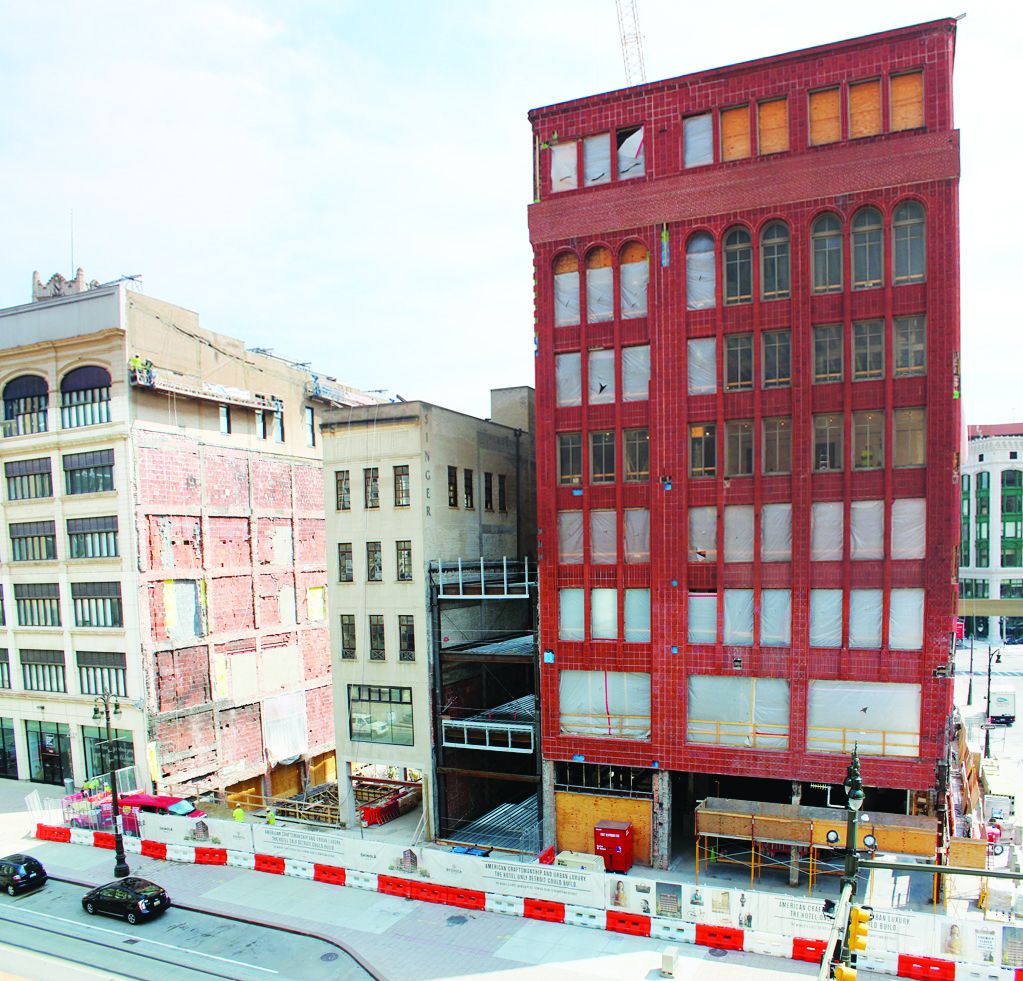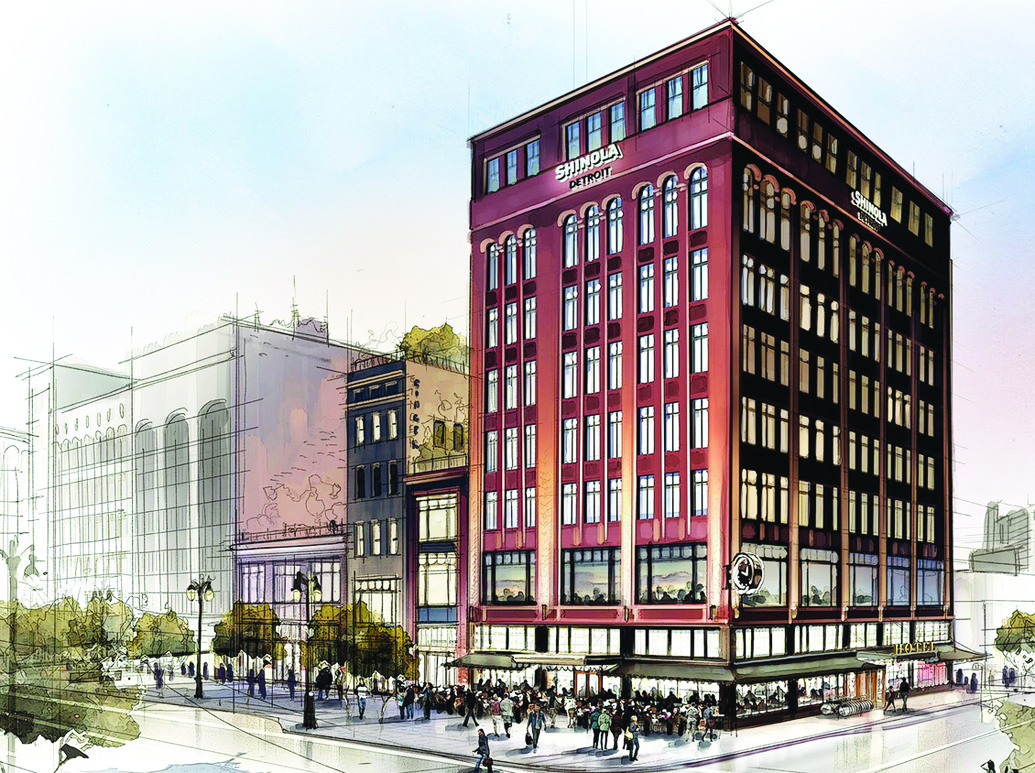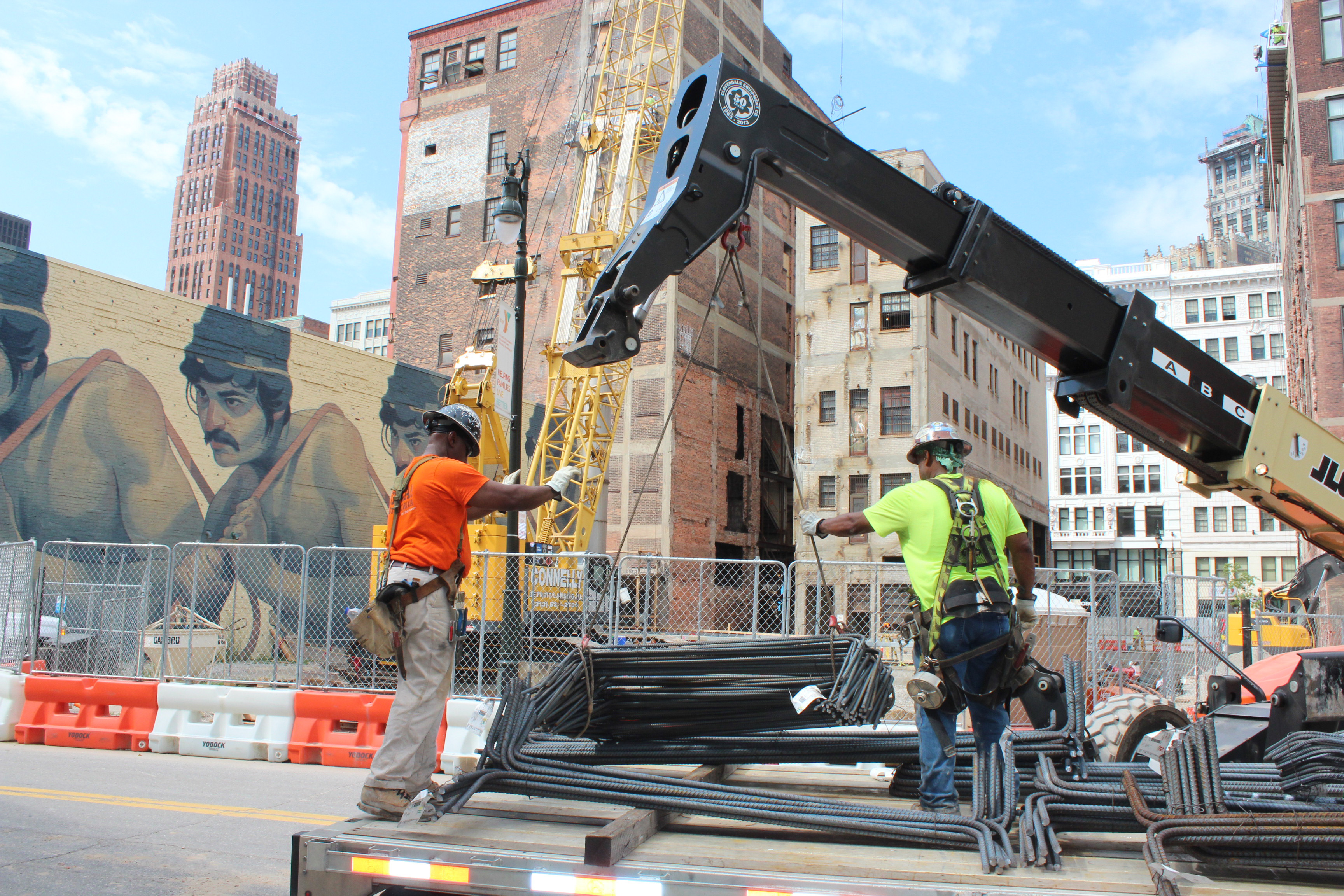Hardware, wigs, sewing machines... Shinola Hotel next for Woodward site
Date Posted: August 4 2017
DETROIT - Anything goes when it comes to rehabilitating old buildings into new uses.

BUILT IN 1915, the eight-story red-tiled building at right will be the signature structure in the development of the new Shinola Hotel in Detroit along Woodward Avenue. Also incorporated into the project (between the gaps of demolished buildings) is the former local headquarters for the Singer Sewing Machine Co., a tan-colored five-story building erected in 1936.

A RENDERING of the completed Shinola Hotel, at Woodward and Grand River, just north of the Hudson’s Building site that’s awaiting re-development.

So it goes with the block at and just north of 1400 Woodward in Detroit, where the Shinola Hotel is under construction.
The signature red-tiled building in the development was originally constructed in 1915, expanded in 1925, modified in the 1930s and then again in the 1950s. The eight-story building at Woodward and Grand River opened as a hardware store, was transformed into a store for Meyer Treasure Chest Jewelry in the 1950s, and its last use was as a shop for the Eastern Wig & Hair Co.
Now Shinola is branching out from its core business as a maker of high-end watches, bicycles, and leather goods, partnering with Dan Gilbert's real estate company Bedrock, to build a 130-room hotel. Located just north of the former site of the Hudson's building that's awaiting redevelopment, Shinola says the boutique hotel is expected to combine the company's "high-quality, American built craftsmanship and Bedrock’s development and urban revitalization expertise."
“We are excited about this venture because it presents a challenging creative exercise to create a boutique hotel concept that Detroit will be proud of. We’ve assembled best-in-class talent that will result in an experience which reflects the philosophy of the Shinola brand.” said Shinola founder Tom Kartsotis. “We are partnering with industry experts like Gachot Studios for interior design and help with real estate development, as well as NoHo Hospitality to guide the food and beverage programming."
The hotel will include a restaurant, and about 16,000 square-feet of shops including a retail-filled "alley."
Barton Malow is managing construction of the project, which began earlier this year and in recent weeks has been employing 70-100 building trades workers. Their tasks have included re-bar installation and concrete work, new structural steel placement, masonry repair and initial mechanical, electrical and plumbing work.
The project has involved what amounts to surgical-style removal of three small buildings that had frontage on Woodward, without damaging the adjacent buildings that will be used in the new hotel. Homrich and their workforce expertly handled the demo work, said Barton Malow Project Manager Jeff Stachowiak. He said two of the buildings were erected separately, but were connected over time, complicating their demolition.
"Lots of detailed planning and safety engineering went into the project before we started," he said. "They were vacant buildings, and a lot of interior demo was necessary to understand what we needed to do to take it down. The result of all that planning is that the process went really, really well."
Woodward Avenue was developed and redeveloped multiple times since the city's street grid was laid out by Augustus Woodward, the first chief justice of the Michigan Territory, after a fire destroyed most of the city in 1805. Despite two centuries of construction and re-construction at the Shinola site, "we weren't thinking we'd find anything unexpected underground, and we really didn't," Stachowiak said. "There were some old cobblestone and concrete foundations, and a vault under the sidewalk, which was a pretty cool find, but no old utilities or anything that would hold us up."
The scope of this project involves the rehabilitation of two historic buildings and the design of three newly constructed buildings.
Kraemer Design Group is the architect of record for the project, charged with melding the diverse block of new and old buildings into a modern hotel. The red-tiled building that's most prominent in the project was formerly known as the Armstrong Building, the Rayl Building and the Meyer Jewelry Building. "This century-old building is Detroit’s best example of art nouveau Sullivanesque-style architecture," Kraemer Design Group said.
The other historic building that's being melded into this renovation is the 11,000-square-foot Singer Building, built in 1936 for the sewing machine manufacturer of the same name. "Its primary façade is clad with limestone, and it has an understated neo-classical design," Kraemer says. Two of the three new buildings that will be constructed as part of the project will be on Woodward, with one standing eight and a half stories tall and the other five stories tall. The third new construction building, according to Kraemer, will be located at the back of the project along Farmer Street and will offer additional restaurants, retail, and event spaces for the hotel. The Shinola Hotel's 130 guest rooms will be among those combined buildings.
“While Detroit has seen the launch of new hotels over the last few years, we still see a gap in the boutique hotel market,” said Bedrock Executive Vice President Dan Mullen. “The Shinola Hotel will be like nothing else in Detroit and will be strategically located in the now burgeoning shopping district on Woodward Avenue. We know out of town visitors will appreciate the central location and unique experience the hotel will offer, while local Detroiters will want to stop in for a dinner or drink while shopping downtown.”
The project is expected to be complete in late 2018. "The trades, the subs, they've been great," Stachowiak said. "We're used to working with a lot of them, and they have done a great job for us."

BUILT IN 1915, the eight-story red-tiled building at right will be the signature structure in the development of the new Shinola Hotel in Detroit along Woodward Avenue. Also incorporated into the project (between the gaps of demolished buildings) is the former local headquarters for the Singer Sewing Machine Co., a tan-colored five-story building erected in 1936.

A RENDERING of the completed Shinola Hotel, at Woodward and Grand River, just north of the Hudson’s Building site that’s awaiting re-development.

IRON WORKERS Terrence Brown and and Bernard Brown, who are Local 25 brothers and biological brothers, hook up a load of re-bar from a flatbed trailer at the rear of the Shinola site in Detroit. They’re employed by Barton Malow.
